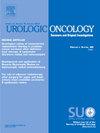Does ureteral stent drainage prior to radical nephroureterectomy increase the risk of intravesical tumor recurrence?
IF 2.3
3区 医学
Q3 ONCOLOGY
Urologic Oncology-seminars and Original Investigations
Pub Date : 2025-08-09
DOI:10.1016/j.urolonc.2025.07.012
引用次数: 0
Abstract
Purpose
To investigate whether ureteral stent drainage (USD) increases the risk of intravesical recurrence in patients with upper tract urothelial carcinoma (UTUC) treated with radical nephroureterectomy (RNU).
Methods
This retrospective study was conducted involving 2,756 upper tract urothelial carcinoma (UTUC) patients treated with RNU between 2000 and 2022, of whom 77 had a history of USD. The primary endpoint was to assess the association between USD and post-RNU bladder recurrence-free survival (BRFS). A 1:3 propensity score-matching analysis was performed to compare patients with and without a history of USD. Kaplan-Meier analyses, along with univariate and multivariate Cox proportional hazard modeling, were employed to compare BRFS, overall survival, cancer-specific survival, and contralateral recurrence-free survival.
Results
Kaplan–Meier analysis demonstrated a significant difference in BRFS between patients with and without a history of USD in the entire cohort (P = 0.022). However, in the matched cohort, no significant difference in BRFS was observed. Both univariate and multivariate Cox regression analyses revealed that prior ureteroscopy with biopsy was associated with intravesical recurrence, but USD history did not increase the risk of bladder recurrence, regardless of whether ureteroscopy was performed. Further analysis demonstrated that preoperative USD significantly improved pre-RNU renal function in patients with chronic kidney disease stage 3-5.
Conclusion
The use of USD does not increase the risk of intravesical recurrence and has minimal impact on oncologic outcomes. Additionally, preoperative USD improves renal function, thereby expanding neoadjuvant treatment options for patients with compromised kidney function.
根治性肾输尿管切除术前输尿管支架引流是否会增加膀胱内肿瘤复发的风险?
目的:探讨输尿管支架引流术(USD)是否会增加上路尿路上皮癌(UTUC)行根治性肾输尿管切除术(RNU)患者膀胱内复发的风险。方法:回顾性研究2000年至2022年间2756例接受RNU治疗的上尿路上皮癌(UTUC)患者,其中77例有USD病史。主要终点是评估USD与rnu后膀胱无复发生存(BRFS)之间的关系。采用1:3倾向评分匹配分析比较有和没有USD病史的患者。Kaplan-Meier分析,以及单变量和多变量Cox比例风险模型,用于比较BRFS、总生存率、癌症特异性生存率和对侧无复发生存率。结果:Kaplan-Meier分析显示,在整个队列中,有和没有USD病史的患者的BRFS有显著差异(P = 0.022)。然而,在匹配的队列中,没有观察到BRFS的显著差异。单因素和多因素Cox回归分析显示,既往输尿管镜活检与膀胱内复发相关,但无论是否进行输尿管镜检查,USD病史均不会增加膀胱复发的风险。进一步分析表明,术前USD可显著改善3-5期慢性肾病患者rnu前的肾功能。结论:使用USD不会增加膀胱内复发的风险,对肿瘤预后的影响最小。此外,术前USD可改善肾功能,从而扩大肾功能受损患者的新辅助治疗选择。
本文章由计算机程序翻译,如有差异,请以英文原文为准。
求助全文
约1分钟内获得全文
求助全文
来源期刊
CiteScore
4.80
自引率
3.70%
发文量
297
审稿时长
7.6 weeks
期刊介绍:
Urologic Oncology: Seminars and Original Investigations is the official journal of the Society of Urologic Oncology. The journal publishes practical, timely, and relevant clinical and basic science research articles which address any aspect of urologic oncology. Each issue comprises original research, news and topics, survey articles providing short commentaries on other important articles in the urologic oncology literature, and reviews including an in-depth Seminar examining a specific clinical dilemma. The journal periodically publishes supplement issues devoted to areas of current interest to the urologic oncology community. Articles published are of interest to researchers and the clinicians involved in the practice of urologic oncology including urologists, oncologists, and radiologists.

 求助内容:
求助内容: 应助结果提醒方式:
应助结果提醒方式:


